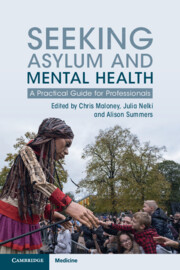Book contents
- Seeking Asylum and Mental Health
- Seeking Asylum and Mental Health
- Copyright page
- Contents
- The Authors
- Foreword
- Acknowledgements
- Glossary
- Introduction
- 1 Why do people seek asylum? The global context
- 2 Seeking asylum in the United Kingdom
- 3 Seeking asylum and mental health
- 4 Access to mental health care
- 5 Assessing mental health needs
- 6 Interpreting assessment findings
- 7 Formulation and diagnosis
- 8 Common diagnoses
- 9 Intervention: the essentials
- 10 Specific interventions
- 11 Children, families, and young people
- 12 Records and reports
- 13 Improving mental health services
- 14 Therapeutic complexity
- 15 Working with people seeking asylum
- Some resources
- Index
- References
14 - Therapeutic complexity
Published online by Cambridge University Press: 26 August 2022
- Seeking Asylum and Mental Health
- Seeking Asylum and Mental Health
- Copyright page
- Contents
- The Authors
- Foreword
- Acknowledgements
- Glossary
- Introduction
- 1 Why do people seek asylum? The global context
- 2 Seeking asylum in the United Kingdom
- 3 Seeking asylum and mental health
- 4 Access to mental health care
- 5 Assessing mental health needs
- 6 Interpreting assessment findings
- 7 Formulation and diagnosis
- 8 Common diagnoses
- 9 Intervention: the essentials
- 10 Specific interventions
- 11 Children, families, and young people
- 12 Records and reports
- 13 Improving mental health services
- 14 Therapeutic complexity
- 15 Working with people seeking asylum
- Some resources
- Index
- References
Summary
The story of Abed provides context for considering the importance of attending to complexity. Abed identified his problem as needing asylum. His story illustrates that the ‘overwhelmingness’ of severe forms of adversity can lead to oversimplification and polarised perceptions where refugees are seen as ‘traumatised’ or ‘resilient’, ‘dangerous’ or ‘vulnerable’ and those working with them as ‘omnipotent’ or ‘impotent’.‘Discerning complexity’ means appreciation that reality includes both polarised positions, and much more.Abed recognised how he and agencies he had encountered had co-constructed a ‘trauma narrative’, an oversimplified picture of himself as damaged and vulnerable. His trauma story had become his identity story, a ‘narrative passport’. In therapy he became aware of important events and experiences excluded from this story and of how he had been able to retain many previous strengths as well as developing new ones.The ‘Adversity Grid’ is outlined as a framework for grasping the wider consequences of exposureto adversity, and ‘synergic therapeutic complexity’ as aperspective that enables caregivers to connect their own strengths with those of their beneficiaries.
Keywords
- Type
- Chapter
- Information
- Seeking Asylum and Mental HealthA Practical Guide for Professionals, pp. 275 - 287Publisher: Cambridge University PressPrint publication year: 2022
References
- 1
- Cited by

